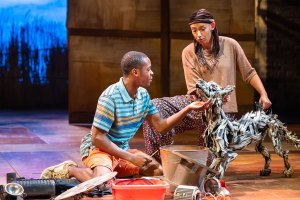Ian Lloyd Anderson on why Mark O’Rowe is one of Ireland’s greatest living writers
Mark O’Rowe’s Reunion has its UK premiere at the Kiln Theatre this month

Ian Lloyd Anderson is in high spirits.
The Dublin-based actor is back in rehearsals for Mark O’Rowe’s acclaimed play, Reunion, which is transferring to London’s Kiln Theatre for a limited season. We catch him during a break in Dublin, where the cast is deep in preparation before heading to London.
“We’re in Trinity College at the moment, rehearsing at the Samuel Beckett Centre,” he explains. “We’re here for a couple of weeks before we decamp to London on Sunday week.”
For the cast, returning to a role isn’t as simple as picking up where they left off. The initial run, which was a hit at the Dublin Theatre Festival, saw rehearsals in a “sleepy village called Rathmines.” This time, with new cast members and a new location, the experience is, as Anderson puts it, “slightly different.”
“When you have cast changes, it feels really different,” he says. “You have to learn to trust that you’ll evolve with it, which can be quite scary, even when you’re working with wonderful actors. You feel it in yourself because the rhythms become so ingrained in you, especially with good writing.”
The actor acknowledges a common misconception that returning to a role is easy. “People assume you’re just picking up where you left off,” he muses. “But you’re a completely different person. The role has had time to percolate, and there can be lovely changes. Though you can also lose things you might have loved from the first time.”
This unpredictability, he believes, is the very essence of live theatre. “You’re not regurgitating something. That’s the beauty of it.”
When the opportunity arose to reprise his role in Reunion, Anderson says there was never a question of turning it down. His admiration for playwright and director Mark O’Rowe goes back a long way.
“I’d done a play with Mark ten years ago called Our Few and Evil Days, a really wonderful play. Even in drama school, he was a hero of mine. His work made me realise I loved theatre.”
Anderson is a firm believer that O’Rowe’s work hasn’t been seen enough on the international stage. “For me, he’s one of our greatest ever writers, never mind living writers,” he states emphatically. “He’s that good. And this, you know, it’s just a wonderful play with this sort of Jacobian feel to it.”
Reunion, which follows a family get-together (taking place “on an island off the coast of Ireland”) that is upended by an unexpected visitor, is a true ensemble piece, a quality that Anderson finds particularly refreshing. The lack of a hierarchy in the rehearsal room creates a collaborative and ego-free environment. “It’s gorgeous,” he smiles. “We’re all willing to fight, but not for ourselves, to battle for the play. When it’s such an ensemble piece, you’re serving a brilliant piece of writing.”
Working directly with O’Rowe, who also directs his own work, is an added bonus. “Mark is a very specific director, particularly of his own work,” Anderson explains. “It’s brilliant because you can just go, ‘I don’t know what I’m doing, tell me.'” He recalls the playwright’s blunt but caring honesty. “You can sort of say to Mark, ‘Tell me if I’m sht,’ and he’ll go, ‘Yeah, you’re sht.’ And he’s doing it in the most caring of ways.”
Anderson’s character, Angus, is a far cry from himself. A poet and dreamer from a remote Irish island, he’s had a sheltered upbringing but is, as Anderson insists, “incredibly articulate.” He and O’Rowe were careful to avoid turning Angus into a caricature. “We really focused on him not being a silly version of a poet slash writer slash bit of a dreamer,” he says. The character’s distance from his own personality is what makes the role so appealing. “That’s probably why I was so kind of into it,” Anderson admits. “I love that Mark came to me with that part and didn’t kind of come and say, ‘You know, I’ve got this character who’s from Dublin.’ It’s great because you get to satisfy your own cravings as an actor.” He finds a certain synchronicity in playing a writer. “He knows a lot more than me about being a writer,” Anderson laughs. “But the two things can’t be that far removed. They can’t exist without one another.”

The conversation turns to the growing appreciation for Irish writers in London’s theatre scene. Anderson acknowledges the surge in Irish work recently, but also questions whether it’s a long-term commitment or a passing trend. “It’s not British theatre’s responsibility to give Irish plays a platform,” he says, “but I do think there’s a hunger for them.”
He cites examples like Polly Findlay’s forthcoming production of Tom Murphy’s A Whistle in the Dark at the National Theatre. “For me, that’s probably one of the top three plays ever,” he says. “It’s brilliant to have a play like that going into the National.” He adds that it’s crucial for these plays to avoid becoming a “diddly-eye” caricature. “This is very current, a middle-class family who… I think it’s really important that that side of Irish life is represented.”
Anderson feels the connection between the National Theatre in London and Dublin’s Abbey Theatre is significant, referencing how both Laurence Olivier and Arthur Miller acknowledged the Abbey’s influence. “For it to be connected now to a juggernaut like the National in London is massive,” he says. “I think we’re all really thankful for that.”
Having worked at London theatres like the Lyric Hammersmith and the National, Anderson has a deep appreciation for London audiences. He finds them “ever so slightly more conservative” in their reception, but in a respectful way. “They just are, particularly being receptive to Irish plays,” he explains. “They’re raised on theatre. They understand; there’s such a theatre intelligence.” London’s massive theatre history contributes to an audience that is “really receptive, really intelligent.” Anderson loves the city, despite not living there full-time. “There’s something f**king romantic about just doing a play in London and doing your bit and jumping on the tube home,” he says.
Ultimately, however, Anderson’s passion for the work shines through. “The whole thing of doing this job is… I just really, really want a wider audience to see Mark’s work. He’s an incredible writer.” I suggest that one great production can change everything for a writer. Anderson agrees, referencing Conor McPherson’s The Weir as an example. “It just explodes,” he says. “And it’s very refreshing to hear you say one good production, not one good play, because it’s true. Great plays can often not have great productions.”
When asked what he’s learned from returning to the role of Angus, Anderson is pragmatic. “I don’t think enough time has passed. I think I’m still in the job,” he reflects. He believes that lessons as an actor often only become apparent much later. He recounts a story of a veteran actor giving him a note years ago that he initially resented but later realised was completely correct. “He was completely right,” Anderson says. “I’d spent two years thinking he was an a*sehole, but he wasn’t. He was being completely generous.” This experience taught him the value of letting things “percolate.” “You can’t just bash something in the rehearsal room,” he says. “You have to leave it, walk away, and go back to it tomorrow. Some of the crap will have fallen away.”
As he’s gotten older, he’s learned to embrace this process and not be afraid of it. He also notes the shift in the industry, where younger actors are more focused on screen work. “Everyone wants to be on TV,” he says, “and I get it, because everyone wants to make a living.” He contrasts this with his own beginnings, where all he wanted to do was “do plays and work in the Abbey” and drink pints with older actors. But theatre, he insists, is a sacred space.
“You’re so removed from your screen work,” he says. “Whereas with theatre, there’s an immediacy. It can’t be censored in the moment, and there are very few spaces like that anymore.” He concludes by highlighting the ephemeral nature of live performance. “What happens in the moment stays in that moment and it can’t be changed by anyone… it exists in its moment and it passes and it’s gone.”













